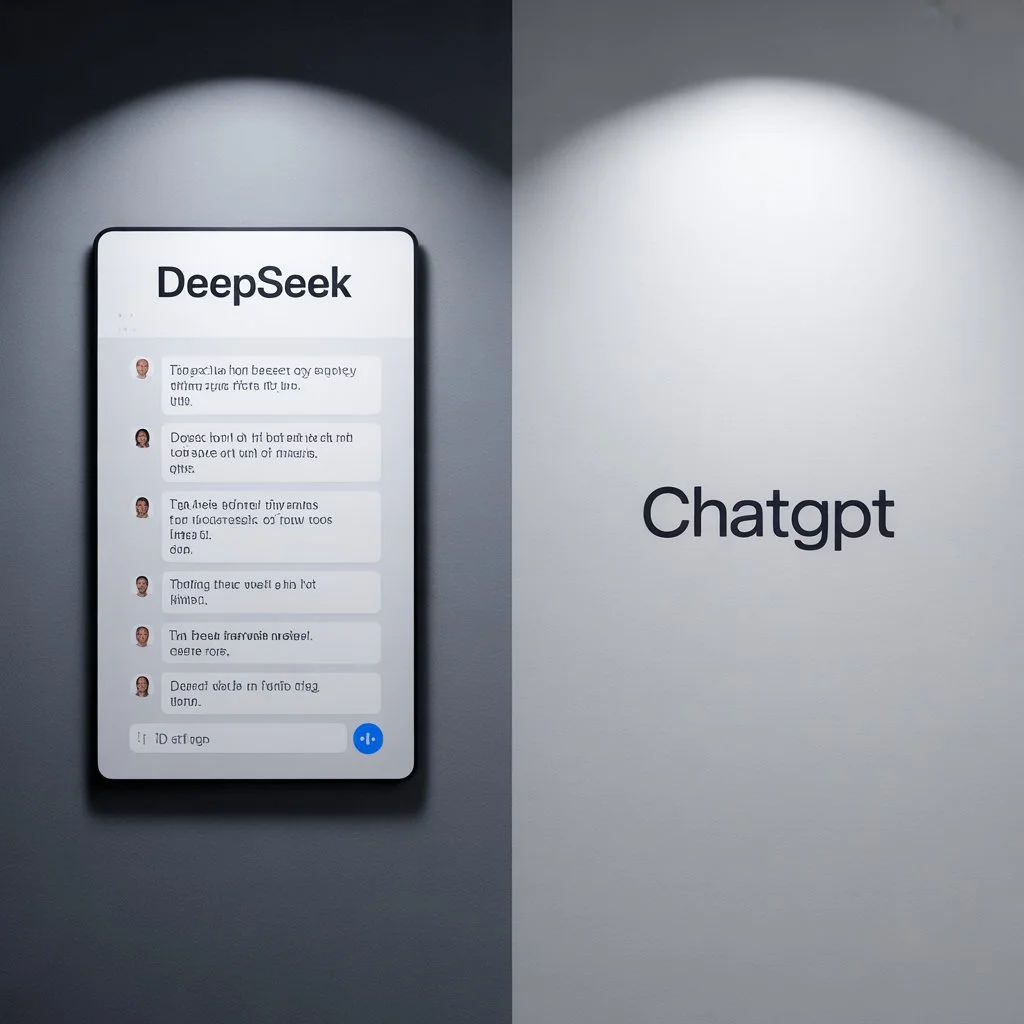DeepSeek AI vs ChatGPT: Which is Better for SEO Keyword Research?
Are you looking to improve your website’s search engine rankings? Keyword research is the foundation of any successful SEO strategy. In the world of AI, two names often come up: DeepSeek AI and ChatGPT. But which one is better for SEO keyword research?
This guide will compare DeepSeek AI and ChatGPT. We’ll explore their strengths and weaknesses for keyword research. By the end, you’ll know which tool best fits your SEO needs. Let’s dive in and find out which AI can boost your search engine optimization!
What is ChatGPT?
ChatGPT is a powerful language model created by OpenAI. It uses natural language processing (NLP) to understand and generate human-like text. Think of it as a super-smart chatbot that can answer questions, write content, and even brainstorm ideas.
Capabilities for Content Generation and More
ChatGPT is versatile and can be used in many ways:
- Content Generation: Create blog posts, social media updates, and website copy.
- Customer Support: Power chatbots to answer customer questions quickly.
- Language Learning: Help users practice conversations in different languages.
- Personal Productivity: Draft emails, summarize reports, and brainstorm ideas.
For example, a digital marketing agency can use ChatGPT to quickly create blog post drafts. This saves time and helps them produce more content.
Key Features of ChatGPT
- Advanced Language Processing: Understands and generates natural-sounding text.
- Conversational AI: Maintains context during conversations for more engaging interactions.
- Multimodal Capabilities: Newer versions can process images, audio, and text.
Strengths: Adaptability, Ease of Use, and Accessibility
ChatGPT has several advantages:
- High Adaptability: It can be fine-tuned for specific industries like healthcare or finance.
- Ease of Use: Anyone can use it with simple text prompts. No technical skills are needed.
- Wide Accessibility: Available on the web, mobile apps, and through API integrations.
A small business owner can use ChatGPT to create marketing content without hiring a professional writer. It’s that easy!
Weaknesses: Limited SEO-Specific Features
While ChatGPT is great for content creation, it’s not specifically designed for SEO. It lacks built-in tools for keyword research, search intent analysis, and ranking insights. To improve rankings, you need to use other SEO tools alongside ChatGPT.
For example, a content writer might use Google Keyword Planner or Ahrefs to find trending keywords. Then, they can use ChatGPT to write articles that include those keywords naturally.
What is DeepSeek AI?
DeepSeek AI is designed to help businesses create SEO-friendly content. Unlike ChatGPT, which focuses on general conversational abilities, DeepSeek AI specializes in keyword optimization, content structure, and ranking-focused content generation.
How DeepSeek AI Enhances SEO Performance
DeepSeek AI focuses on search intent, keyword placement, and content structure to align with search engine algorithms. It goes beyond just generating text and helps optimize content for higher search rankings.
Imagine a tech website wants to rank for “best budget smartphones.” DeepSeek AI can:
- Identify high-traffic, low-competition keywords.
- Structure content with SEO-friendly headings (H1, H2, H3).
- Ensure optimal keyword density and use related keywords.
- Align with search engine E-E-A-T (Experience, Expertise, Authoritativeness, Trustworthiness) guidelines.
Key Features of DeepSeek AI
-
Advanced Keyword Analysis
DeepSeek AI conducts real-time competitor analysis. It also suggests long-tail and semantic keywords for better visibility.
For example, if your main keyword is “best running shoes,” it might suggest related terms like “shock absorption” and “arch support.”
-
AI-Driven Content Structuring
It ensures proper use of meta descriptions, header tags, and internal linking. Articles are organized into logical sections for better readability and SEO.
A blog on “Top Travel Destinations” could be structured into sections like “Budget-Friendly Places” and “Luxury Retreats” to match user search intent.
-
SERP Intent Matching
DeepSeek AI analyzes search engine results pages (SERPs) to create format-specific content. This ensures that listicles, guides, and reviews match what search engines prefer.
If someone searches for “best laptops under $1000,” DeepSeek AI structures content with comparisons, features, and pros & cons.
Strengths: Why DeepSeek AI Excels in SEO
- Deep SEO Integration: Tailored for search engine ranking factors.
- Ranking-Focused Content: Generates content designed to outrank competitors.
- Automated Competitive Analysis: Examines top-ranking pages to identify key ranking elements.
If you need to create a guide on “SEO Trends 2025,” DeepSeek AI will analyze top-performing articles. It will then structure your content accordingly to improve your chances of ranking higher.
Weaknesses: Where DeepSeek AI Falls Short
- Limited Versatility: Not ideal for creative writing or general AI tasks.
- Less Human-Like: Content might need manual adjustments for tone and engagement.
- Requires SEO Knowledge: Users need some SEO expertise to use the advanced features effectively.
Comparative Analysis of ChatGPT & DeepSeek AI for SEO Keyword Research
Now, let’s compare ChatGPT and DeepSeek AI in key areas for SEO keyword research.
Content Generation & Quality
- ChatGPT: Excels in generating creative and conversational content. It’s great for storytelling, marketing copy, and general inquiries.
- DeepSeek AI: Specializes in technical content and complex problem-solving. It delivers precise and efficient outputs.
ChatGPT is versatile for creative writing. DeepSeek AI performs better in technical domains. For SEO, this means ChatGPT can create engaging content, but DeepSeek AI can create more technically accurate and optimized content.
SEO & Keyword Optimization
- ChatGPT: Lacks built-in SEO tools. It requires manual input for keyword optimization.
- DeepSeek AI: Designed with SEO in mind. It offers features like keyword analysis and content structuring to improve search engine rankings.
DeepSeek AI is better for SEO-driven content. ChatGPT needs extra effort for optimization. If your primary goal is to rank higher in search results, DeepSeek AI has a clear advantage.
AI-Powered Research & Data Accuracy
- ChatGPT: Provides general information based on its training data. It may lack real-time accuracy.
- DeepSeek AI: Uses advanced algorithms for real-time data analysis. It offers up-to-date and precise information, especially in technical fields.
ChatGPT is good for general information. DeepSeek AI provides more data-centric results. For SEO keyword research, real-time data and accuracy are crucial for identifying current trends and opportunities.
Customization & Prompt Handling
- ChatGPT: Offers flexible prompt handling suitable for various topics.
- DeepSeek AI: Tailored for specific tasks, especially technical queries. It provides more specialized responses.
ChatGPT offers broader customization. DeepSeek AI excels in specialized prompt handling. If you need specific SEO-related tasks done, DeepSeek AI’s focused approach can be more efficient.
Ease of Use & User Experience
- ChatGPT: User-friendly interface with a focus on conversational interactions.
- DeepSeek AI: May require a learning curve due to its specialized features. However, it offers efficient workflows for technical users.
ChatGPT is more accessible to general users. DeepSeek AI caters to those with technical expertise. If you’re comfortable with SEO tools and data analysis, DeepSeek AI’s interface will likely suit you well.
Plagiarism & Originality
- ChatGPT: Generates content based on patterns in its training data. There’s a low risk of plagiarism, but the output might be generic.
- DeepSeek AI: Focuses on original content generation, especially in technical writing. This minimizes plagiarism concerns.
Both models prioritize originality. However, you should always review outputs for uniqueness. Ensuring your content is original is vital for SEO to avoid penalties from search engines.
DeepSeek AI: A Closer Look at its SEO Capabilities
DeepSeek AI has quickly become a significant player in the AI world. It’s known for its open-source approach and efficient AI solutions. Founded by Liang Wenfeng, DeepSeek focuses on making advanced AI technology accessible to more people.
DeepSeek’s R1 Shakes Up the Market
DeepSeek’s R1 model has made waves in the AI community. It’s seen as a strong competitor to models like OpenAI’s ChatGPT. R1 is designed to be cost-effective, making it appealing to researchers and developers with limited resources.
One of the key advantages of R1 is its efficiency. It can rival ChatGPT in certain areas while operating at a lower cost. This is good news for those who want advanced AI capabilities without spending a lot of money.
DeepSeek Release History
DeepSeek AI has evolved through several versions, each with its own features and improvements.
| Version | Release Date | Key Features | Challenges |
|---|---|---|---|
| DeepSeek LLM | November 2, 2023 | Open-source, free for research and commercial use, focus on coding tasks | Limited scalability, computational efficiency issues |
| V2 | May 2024 | Cost-effective pricing | Competition from higher-ranked models, limited market penetration |
| V3 | December 2024 | 671 billion parameters, trained on 14.8 trillion tokens, outperformed Llama 3.1 and Qwen 2.5 | High training costs, geopolitical tensions affecting AI development |
| R1 | November 2024 | Specialized in logical inference and mathematical reasoning, surpassed OpenAI’s equivalent, trained using reinforcement learning | Readability issues in outputs, mixed performance in real-world problem-solving |
DeepSeek’s Path Since Launch
Since its launch in May 2023, DeepSeek has quickly become a key player in the AI industry. It has overcome challenges like US export controls on advanced GPUs by focusing on efficiency and collaboration.
DeepSeek’s models can handle complex tasks like advanced mathematics and coding without needing powerful GPUs. This is achieved by optimizing memory usage and using a chain-of-thought approach.
DeepSeek R1 vs. ChatGPT o1
DeepSeek’s R1 model is a strong competitor to OpenAI’s ChatGPT o1. R1 aims to rival ChatGPT o1 in several benchmarks while being more cost-effective. This makes it a potential breakthrough for researchers and developers with limited resources.
What Makes the R1 Different From o1
- Cost Efficiency: R1 operates at a fraction of the cost.
- Engineering Simplicity: R1 focuses on accurate answers with minimal computational demands.
- Open Source Accessibility: DeepSeek has released smaller versions of R1 that can run on standard laptops.
How to Use DeepSeek AI for SEO Keyword Research
DeepSeek AI can be a game-changer for your SEO strategy. Here’s a step-by-step guide on how to use it for keyword research:
1. Set Up Your DeepSeek AI Account
Visit the DeepSeek AI website and sign up for an account. The registration process is simple and straightforward.
2. Input Your Primary Keywords
Start by entering your main topic or primary keyword into the search bar. For example, type “best SEO tools for small business.”
3. Analyze the Data
DeepSeek AI will generate a list of related keywords and search queries. It will also show you important metrics like search volume and competition level.
4. Crafting Your Keyword Strategy
Creating an effective keyword strategy is about precision and focus. Here’s how you can use DeepSeek AI to build a winning keyword strategy:
- Target High-Value, Long-Tail Keywords: Focus on specificity. Long-tail keywords tend to have lower competition and higher conversion rates.
- Align Keywords with Search Intent: Understand user needs. DeepSeek AI provides insights into the intent behind each search term.
- Competitor Gap Analysis: Identify content gaps. DeepSeek AI can show you which keywords your competitors are ranking for that you’re missing out on.
5. DeepSeek AI Content Optimization
Having the right keywords is only half the battle. Now you need to optimize your content to ensure maximum visibility. DeepSeek AI excels in content optimization by offering data-driven recommendations.
- Optimize Headlines and Meta Descriptions: Craft compelling titles. Use high-impact headlines that incorporate your target keywords naturally.
- Enhance Content Structure: Use subheadings, bullet points, and short paragraphs. This makes your content easier to read and more engaging.
- Integrate Keywords Seamlessly: Avoid keyword stuffing. Instead, let your keywords flow naturally within the content.
ChatGPT vs DeepSeek: Performance Test
To see which AI is better for specific marketing needs, let’s look at a performance test where the same prompts were given to both ChatGPT and DeepSeek.
Social Media & Copywriting
Winner: ChatGPT
ChatGPT went into more detail and showed a deeper understanding of the task. It’s the clear winner when it comes to campaign ideation and copywriting.
SEO & Keyword Research
Winner: DeepSeek
DeepSeek provides a comprehensive analysis by suggesting various keyword categories, types, intent, and competition levels. It also creates detailed keyword clusters for better strategic implementation.
Performance Marketing
Winner: ChatGPT
ChatGPT not only provided the PPC keywords but also crafted the ad messaging. It highlighted in-segment keywords while avoiding generic terms. ChatGPT has bucketed the audience based on intent, competition, and industry, which DeepSeek missed.
Final Verdict: Which AI Should You Use?
Here’s a summary of which AI model is best for each marketing use case:
- SEO & Blog Content: DeepSeek
- Social Media Copywriting: ChatGPT
- Google Ads & PPC Copy: ChatGPT
10 DeepSeek Prompts for SEO
Here are 10 DeepSeek prompts that can improve your SEO results:
- Generate Blog Post Ideas: “Generate 5 blog ideas targeting the keyword [your keyword] that attract readers and improve search rankings.”
- Write a Meta Description: “Create a 150-character meta description for a webpage about [your topic] that is concise, relevant, and encourages clicks.”
- Generate Long-Tail Keywords: “Provide 5 long-tail keyword variations for [your main keyword] to target niche audiences.”
- Create a Content Outline: “Develop a detailed content outline optimized for SEO for a blog targeting [your keyword].”
- Suggest Internal Links: “Identify 5 internal linking opportunities for a blog post about [your topic] to improve site navigation and SEO.”
- Generate FAQ Schema Questions: “Generate 5 FAQ schema questions that align with the keyword [your keyword] to enhance SEO and user experience.”
- Write a Title Tag: “Create 3 engaging and SEO-friendly title tags that improve click-through rates for a blog post targeting [your keyword].”
- Develop Link-Building Ideas: “Suggest 5 creative link-building ideas to increase domain authority and traffic for a website in the [your industry] niche.”
- Optimize for Voice Search: “Generate 3 conversational, voice-search-friendly questions that users might ask about [your topic].”
- Analyze Competitor Content: “Provide 3 content improvement ideas after analyzing competitor articles on [your topic].”
Conclusion
Choosing between DeepSeek AI and ChatGPT for SEO keyword research depends on your specific needs. DeepSeek AI excels in SEO-focused tasks, providing detailed keyword analysis and content structuring. It’s ideal if your main goal is to improve search engine rankings. On the other hand, ChatGPT is better for generating engaging and creative content. It’s a great choice if you need help with social media or ad copywriting.
Ultimately, the best approach might be to use both tools. Use DeepSeek AI for keyword research and technical SEO, and then use ChatGPT to create compelling content that resonates with your audience. By combining the strengths of both AI models, you can create a powerful SEO strategy that drives traffic and engagement.
FAQs
What is DeepSeek AI used for in SEO?
DeepSeek AI helps create optimized content by generating blog ideas, meta descriptions, and long-tail keywords for SEO.
Can DeepSeek AI generate blog ideas?
Yes, DeepSeek AI can create engaging and SEO-focused blog ideas based on your target keywords.
How does DeepSeek AI improve meta descriptions?
DeepSeek AI generates concise, keyword-rich meta descriptions designed to boost click-through rates.
Can DeepSeek suggest internal linking opportunities?
Yes, DeepSeek can suggest internal links to improve website navigation and SEO performance.
How does DeepSeek AI help with keyword research?
DeepSeek AI generates long-tail keywords and related terms to target niche audiences effectively.
Can DeepSeek AI optimize content for voice search?
Yes, DeepSeek AI generates voice-search-friendly queries to improve rankings for conversational search.
What are DeepSeek’s benefits for SEO beginners?
DeepSeek AI simplifies SEO for beginners by providing clear, actionable prompts for various tasks.
Can DeepSeek AI help with FAQ schema?
Yes, DeepSeek generates FAQ schema questions to enhance SEO and user experience on your website.
Does DeepSeek AI analyze competitor content?
DeepSeek AI suggests ways to improve your content by identifying gaps in competitors’ articles.
Is DeepSeek AI suitable for all industries?
Yes, DeepSeek AI can generate SEO prompts tailored to any industry or niche.






